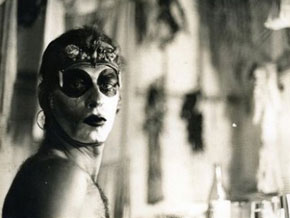Last Monday, August 01st, Ney Matogrosso turned 70 years old. There are seven decades of a life marked by boldness, independence, authenticity and personality, surviving in a country with a liberal reputation, but which increasingly shows its conservative face.
Born Ney de Souza Pereira in Bela Vista, in the state of Mato Grosso do Sul, son of a military father, Ney lived in different places during his childhood and adolescence, such as Rio and Campo Grande. In the 60s, living in Brasília, he tried different professions, until he decided to become an actor, leaving for Rio de Janeiro.
In the capital of Rio, from 1966 onwards, Ney sought to work in the theater, but to survive he adhered to the hippie style, then at its peak – and he manufactured handicrafts, which he sold in the city. It was only in 1971, at the age of 30, that he officially began his singing career, when he joined the nascent group Secos & Molhados.
The band's resounding success is widely known. The LP "Secos & Molhados", from 73, reached the incredible mark of 1 million copies sold. The group became a hit, selling out shows in huge venues like Maracanãzinho. Ney Matogrosso, the vocalist, became a national superstar.
Presenting themselves with an androgynous and wild look, which included feathers, stones, indigenous ornaments, shells, feathers and sparkles, splashed with extravagant makeup, the band members shocked and fascinated the Brazilian public, in the middle of the military dictatorship – in the heaviest phase of the regime, with torture and deaths at their worst.
Secos & Molhados arrived in a period that included Dzi Croquettes – a performance group from Rio that also used the androgynous look – and Edy Star, representative of glam rock in Brazil. Abroad, the glam/glitter rock of David Bowie and bands like Roxy Music and T.Rex would later lead to rockers Kiss – who also put makeup on their faces.
At the front of the band, Ney soon stood out with his impressive performance on stage, and his incredible, high-pitched voice, in an almost feminine register. The singer's artistic power would soon generate the inevitable: he needed his own solo career. Thus, in 74, Secos released their second LP, after which the singer left the troupe.
Ney's solitary career began, as he released impeccable albums in the 70s: "Bandido" (76), "Pecado" (77), "Feitiço" (78), "Seu Tipo" (79), to name a few. And in addition to his excellence on the LPs, he continued to rock the stage, defying censorship and the conservative values of the time, and attracting an eclectic audience to his shows – men and women, gay or not, felt captivated and seduced by the figure of Ney, who shook and provoked on stage, destroying the boundaries between masculine and feminine. Since that time, it is common to hear shouts of "Yummy!" or "Horny!" in the audience at their shows – screams coming from men and women, from 20 to 80 years old, literally.
In the 80s he continued to be active, releasing other classic LPs, such as "Ney Matogrosso" (81) and "Matogrosso" (82). One of his biggest hits is from this time, which spoke precisely about sexual intersection: "Man with H".
Other hits by the singer, among many, were "Não Existe Pecado", "Por De Baixo dos Panos", "Tanto Amar", "Manequim", "Vida Vida", "Vereda Tropical", "Viajante" – many of them, songs from TV soap operas. Not to mention "Pro Dia Nascer Feliz", a song by Cazuza and Roberto Frejat, which Ney turned into a national hit; thus helping to catapult the career of Barão Vermelho and his vocalist, Cazuza – with whom Ney had a quick romance in 1979, before Cazuza became a singer.
The affair between Cazuza and Ney only became famous after the former's death. Cazuza's mother, Lucinha Araújo, commented on the courtship in her 1997 book, "Só as Mães São Felizes", although the topic was discarded in the 2003 film "Cazuza". On the other hand, the romance was shown in the Globo program "Por Toda Minha Vida", in the edition dedicated to Cazuza. Ney himself has also been portrayed in an exclusive "Por Toda Minha Vida".
But, regardless of the romance with Cazuza, the fact is that Ney Matogrosso has never been shy about talking about his sexuality. The singer has said in interviews that in the 70s he lived in a bisexual way, having sex with men and women – according to the style of that time. However, over time, he transitioned to gay life, despite also claiming to hate labels.
"I've had sex with many women and many men. I think this homosexual label is very recent, from the end of the 19th century", said the singer in an interview. "Homosexual, heterosexual, it's all nonsense. It's all human sexuality. These are all labels, it's another form of manipulation, it's clowning. That doesn't matter. What matters is the freedom to express yourself sexually. The ideal is that everyone expresses themselves freely, whether with men or women, however they want. I think this should not have a name."
Ney also said: "I don't fit into anything. I'm a very sexualized person and I express my sexuality in whatever way the moment allows. I know I'm labeled as homosexual. But it's people who label me that way. I don't label myself That way, I don't assume anything, I don't assume that I have to be a certain way just because people think that about me. I'm a normal human being, like anyone else." Asked why he is labeled as gay, he says: "Because I admit that I have sex with men. That's it. I don't have to hide anything."
"I have sex with men, yes. But I have had sex with many women. At this point, I no longer have sex with women," he said in the 2000s. "Inevitably, the relationship turns into a romance. I don't want that. I don't want to have a relationship with no one that has to become marriage. And with women it's impossible to escape that. And they all want to get married. Even the craziest women I've met, the most liberated, deep down they want to get married. I can't have a relationship with someone, I can't have people I have sex with – but I don't want to get married anymore, neither to a man nor to a woman unless lightning strikes my head and makes me change my mind. idea. It can happen!"
In 2008, by the way, Ney interpreted a situation linked to this subject: in the short film "After Everything", by Rafael Saar, the singer played a man who had a leap-year romance with another man, played by actor Nildo Parente.
Ney has also said that he is a survivor. In the 80s, before the AIDS scare, he had sex with men who were already HIV positive, but did not contract HIV. And in addition to all this lucidity and revolutionary stance on the subject – always taboo – of sex, and not being open-mouthed on any topic, including drugs, Ney challenged another taboo: that of old age. After all, it is amazing that a 70-year-old man continues to rock on stage with an energy that is enviable even for 25-year-old boys. And with her voice intact, after 40 years of career.
And that's exactly how it is: after a musical phase in which he put aside his dancing, he recorded more sober albums such as "Pescador de Pérolas" (86) and "À Flor da Pele" (90), as well as "Um Brasileiro" (96, about Chico Buarque's repertoire), after the age of 60 Ney resumed the explosive line that made him famous, and returned with albums and shows such as "Batuque" (2001), "Vagabundo" (2004) and "Inclassifiáveis" (2008, where he appeared with a bold costume and even risked moments of nudity).
"Unclassifiable" ends up being the best label for Ney, since we live in demand for labels. Singer, actor, director, lighting designer, choreographer, the balance that remains is that of a transgressive artist, one of the most important in Brazil, whose work, although involving sexual boundaries, goes beyond this limit and becomes much greater. In today's edition, this column shouldn't even have the name it has, but rather be called "Heroes of Brazil".



